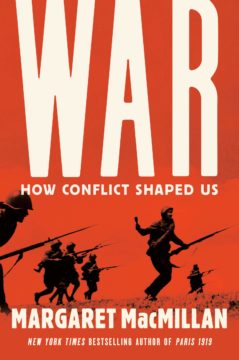Benjamin Cooper in The Common Reader:
 War is a not a word that communicates much. It wants to, but quickly the gruff sound deteriorates into an abstraction and nothing more. War. War. Like love, truth, or beauty, we say the word but cannot see it. The gut does not believe. To title a book War as Margaret MacMillan, the distinguished historian, has done, is to attempt to assert control over the very term itself. As a result, even before the prose begins, War: How Conflict Shaped Us promises to be a revelation: here, war will be understood at last. Such authoritativeness is a noble pursuit, and MacMillan joins others in recent years such as Sebastian Junger and Jeremy Black in a frantic effort to articulate a unified field theory of war before it is too late.¹ “We face the prospect of the end of humanity itself,” MacMillan concludes, if we fail to demystify war in our current moment. (289) That is the project, and given the book’s critical and popular praise from notable figures such as war journalist Dexter Filkins, former National Security Director H.R. McMaster, and former Secretary of State George Schultz, readers might feel it has done its work. I am not so sure, which is not a criticism of MacMillan’s book so much as it is a lament about the relentless inscrutability of war both as an object of academic study and as a lived experience that resists expression.
War is a not a word that communicates much. It wants to, but quickly the gruff sound deteriorates into an abstraction and nothing more. War. War. Like love, truth, or beauty, we say the word but cannot see it. The gut does not believe. To title a book War as Margaret MacMillan, the distinguished historian, has done, is to attempt to assert control over the very term itself. As a result, even before the prose begins, War: How Conflict Shaped Us promises to be a revelation: here, war will be understood at last. Such authoritativeness is a noble pursuit, and MacMillan joins others in recent years such as Sebastian Junger and Jeremy Black in a frantic effort to articulate a unified field theory of war before it is too late.¹ “We face the prospect of the end of humanity itself,” MacMillan concludes, if we fail to demystify war in our current moment. (289) That is the project, and given the book’s critical and popular praise from notable figures such as war journalist Dexter Filkins, former National Security Director H.R. McMaster, and former Secretary of State George Schultz, readers might feel it has done its work. I am not so sure, which is not a criticism of MacMillan’s book so much as it is a lament about the relentless inscrutability of war both as an object of academic study and as a lived experience that resists expression.
More here.
